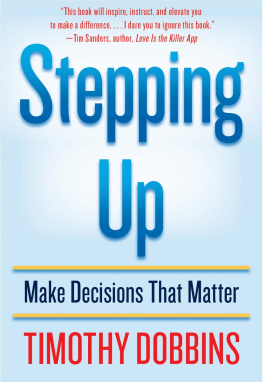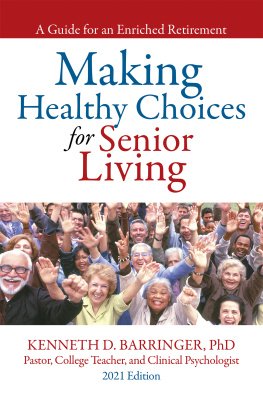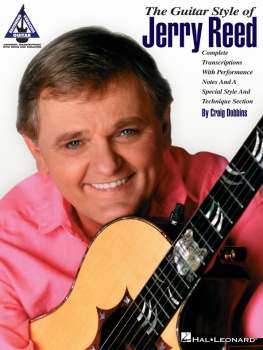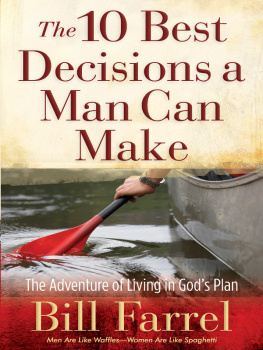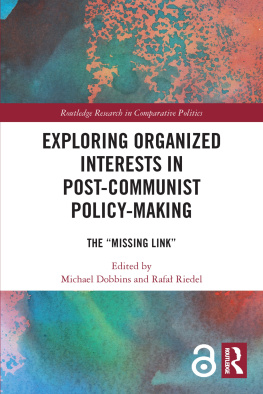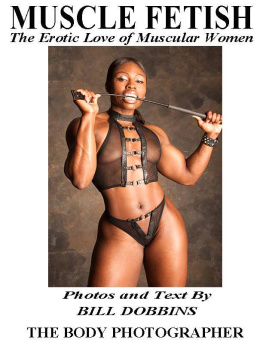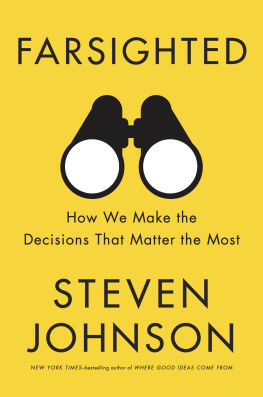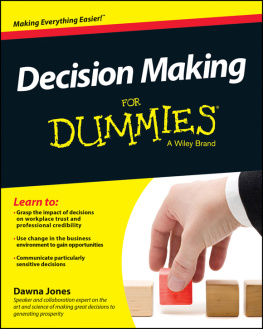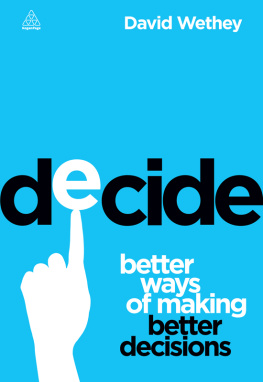With deep gratitude and affectionate appreciation for those clients and parishioners, who over the years have stepped up and allowed me to practice what I teach.
Most importantly, Stepping Up is dedicated to you the reader, who by holding this book in your hands already possess the desire to step up and make decisions that matter: and matter for the common good. What I want to say to you, Henry David Thoreau says best:
W hen was the last time you made a decision that really mattered?
When I ask this question, people often pause before offering an answer. Thats a healthy sign. I want you to pause and reflect on the way you make decisions. This book is intended to be a means for you to look inside yourself and to listen before you take actions so you can step up and make a difference by the decisions you make.
Included are over fifty inspirational stories of people who have stepped up throughout history. They represent the arts, business, religion, education, politics, sports, volunteerism, science, the trades, and many other working categories. Chapters include titles such as: Standing Still, Stepping Aside, Stepping Back, Stepping on Someone Else, and, of course, Stepping Up.
This book is far from inclusive of every subtle nuance on the decision-making process. For example, I dont say much about stepping out, stepping down, stepping away, stepping through, or even stepping in it.
You will, however, bring your own opinions, history, and experiences to the five actions I do explore. Thats what a book, especially this book, is supposed to do: invite you to enter, engage, begin to integrate new insights, and then return to the world more informed and inspired to make decisions that matter.
That way, when you reach the end of your journey you will be able to put the regrets aside and know you tried to step up as you make a difference in life and work. You will know you countedthat you matter. You will, I hope, be grateful for the life given you and the life you give to others by stepping up each and every day.
Timothy D. Dobbins
New York City
2006
W hat do I say to his parents?
Thats what I struggled with as I drove a borrowed car from an office in New York City down to Red Bank, New Jersey. I was heading to a memorial service for Lance Corporal Jourdan Grez, a twenty-four-year-old marine, killed in Iraq when his amphibious assault vehicle was struck by an improvised explosive device.
I was so distracted I almost forgot to change from one set of work clothes into the other. Pulling over at a rest stop along the Jersey Turnpike, I entered the facilities. Wriggling out of my jeans and sport shirt and into my suit, I tucked myself in, snapped on my clerical collar, and headed back down the highway, my transformation from business consultant to Episcopal priest complete. At least outwardly.
There was more than the Grez family tragedy on my mind that day. Years ago, while serving as a parish priest, I officiated at quite a few funerals and memorial services. So, like all clergy, Ive developed some elaborate inner defenses. But mine had been breached. My son was serving alongside Jourdan in Iraq. It could easily have been Johns memorial service today.
The somber formality of the funeral home exterior snapped me out of my reverie and into the moment. I collected myself. As I entered the opulent interior and came face-to-face with Jourdans casket and the gathered mourners, I realized what I needed to say. After spending a few private moments with the family, I rose to speak. I told everyone that I was representing the parents of the marines who couldnt attend, my son, and some of Jourdans other buddies in Iraq. I also told them of the daunting question that had troubled me on my drive.
I said I knew if someone such as me, who has faced situations like this many times, was concerned about this, I was pretty sure most everyone else there was as well. Glancing over to Jourdans family for their okay to begin, I suggested we all stop worrying about what to say, since that wasnt the most important thing. Our presence there said all that needed to be said, perhaps all that could be said. It also helped that Lance Corporal Grezs family conducted themselves with a grace and dignity that transcended the reality of the moment. It would have been easy for any of us to have avoided the gathering. No one would have thought less of us if wed offered our condolences over the telephone, by letter, or even by e-mail. But we had all decided to step up and be there. I said it was our presence, not words said or left unsaid, that made a huge difference, not just to the family, not just to Jourdan, but to each other of us as well. After some further private moments and prayers with the family, I offered my condolences and headed back to New York.
To thank the friend whod loaned me the car, I bought gas, drove it through a car wash, and then stopped at a liquor store to get a bottle of wine for him (and one for me). Explaining to the salesclerk that I was on my way back from a memorial service, I asked if I could use the stores bathroom to change. She readily agreed: sometimes a clerical collar has earthly advantages. Back in my corporate uniform I hopped into the car for my ride back to New York and retransformation. By the time Id entered the elevator for the ride upstairs to one of my clients offices, my concerns had returned to the other work I love.
On the subway home that evening I let out an involuntary sigh and thought about what an exhausting and extraordinary day it had been. But as the train roared downtown, and I watched hundreds of people boarding and leaving the subway car at various stops, each secure in his or her own impenetrable urban bubble, I realized the day, while exhausting, wasnt extraordinary at all.
Every single day, each and every one of us has chance after chance to make a difference in the world, to step up.
Its obvious Lance Corporal Jourdan Grez stepped up and made a difference. He was doing his job. Whatever the merits of the war, Jourdan and his fellow marines, soldiers, sailors, and airmen and airwomen have all nobly volunteered to serve their nation. They chose to dedicate their lives for the duration of their enlistments to the service of their country and its citizens.
The mourners at Jourdans memorial service had stepped up as well. They all could have found a reason to avoid such a painful event, sure to be filled with awkward moments and bound to provoke disquieting feelings. Yet they came to show their respect, support, and love for Jourdan and his family. In the simple act of being there they made a difference.
Every day, we are given opportunities to make a difference; chances to step up. Often these invitations are at work, where most of us spend most of our waking hours. They may come at home while youre sitting down with your family to breakfast. They could come in the office and involve a subordinate, superior, or customer. Or they might appear as youre walking down the street or riding the subway. Where they appear, when they occur, and what they involve doesnt matter. Its what you do when facing them that makes all the difference. Step up by making decisions in matters rare or regular, mundane or monumental, professional or personal, and youll make a difference in the world and experience meaning in your life.

